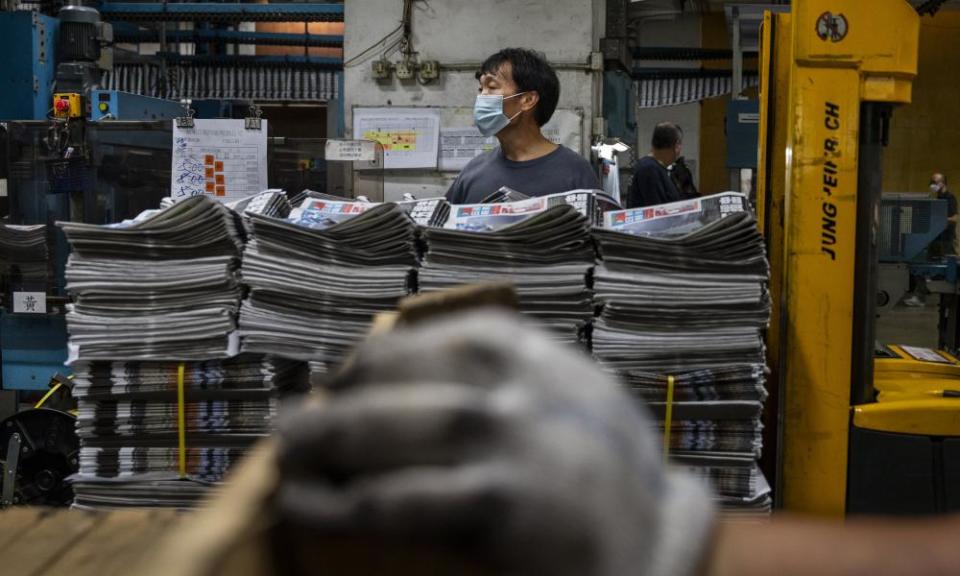‘The blackest day’: Apple Daily’s demise comes as no surprise

The fate of Apple Daily, one of Hong Kong’s bestselling tabloids, should not come as a surprise. On the day Jimmy Lai, its founder, was sentenced to 14 months in prison in April, a commentary in the pro-Beijing newspaper Ta Kung Pao called for a ban on Apple Daily in order to “close national security loopholes”.
The 72-year-old media tycoon and his 26-year-old newspaper have been among the most high-profile critics of Beijing and the controversial national security law (NSL), which they deem “draconian”, but which the authorities say is “necessary”. The law bars secession, subversion and foreign collusion.
Shortly after the news of the paper’s closure made headlines on Wednesday, campaign groups criticised the move. Amnesty International said in a statement that it was “the blackest day for media freedom in Hong Kong’s recent history”. “The fact that the authorities are using the national security law to enable this crackdown highlights the deeply repressive nature of the legislation,” it wrote.
But while critics argue recent moves endanger press freedom, the authorities appear to have their own framing of the saga. On Tuesday, Hong Kong’s chief executive, Carrie Lam, told critics not to “beautify these acts of endangering national security”. Lam’s security chief, John Lee, last week urged the public and the media to cut all ties with several of the newspaper’s executives who had been arrested, “or you’ll regret it very much”.
Related: Hong Kong’s Jimmy Lai and his media empire face uncertain future
‘Rotten apple’
In Beijing, China’s state broadcaster remarked last month that “doomsday is getting closer and closer” for the “rotten apple that plagued Hong Kong for 20 years”. The Global Times this week quoted Louis Chen, the general secretary of Hong Kong Legal Exchange Foundation, as saying: “What Apple Daily has done is crystal clear: the paper takes the national security law as nothing by continuing violating the law and it has gone far beyond ethical and journalistic standards.”
To some mainland Chinese, Apple Daily is a symbol of a split in Chinese identity and the newspaper itself has been viewed as controversial over the years. In 2012, for example, it published a full-page advertisement calling mainland Chinese “locusts” who swarmed Hong Kong to drain its resources. On the social media platform Weibo, a related hashtag created when the paper’s editor was arrested has been viewed 110m times.

Yet, all of this is happening as businesses and news media are recalibrating their strategies in Hong Kong amid the change in political atmosphere. Therefore, the chilling effect among media and individuals is also palpable.
“When people as outspoken as me are unwilling to speak on air about this subject, then you can reasonably infer that they no longer feel safe to speak under the NSL,” David Webb, a prominent Hong Kong investor who held shares in Next Digital – Apple Daily’s parent company – told the media.
For many years, the culture of free speech in Hong Kong attracted the likes of the New York Times and the Financial Times to expand their operations in the former British colony. But in the last few years, as both local and foreign journalists’ associations complain about “deterioration of press freedom”, news media have been rethinking their Hong Kong strategies, too.
The New York Times, for example, last year announced its intention to move some of its Hong Kong staff to Seoul because the NSL “unsettled news organisations and created uncertainty about the city’s prospects as a hub for journalism”. Several other international news outlets are said to be planning a similar move.
Related: Hong Kong leader refuses to say how media can avoid arrest in wake of Apple Daily raids
International press may have the luxury to choose where to be based, but local organisations are likely to end up with limited options. It is difficult to predict what is next in this fluid situation, but analysts are taking the authorities’ use of the Trump-era phrase “fake news” in recent weeks as an indication.
Last month, Lam said her government was working on “fake news” legislation to tackle “misinformation, hatred and lies”. “We will continue to be very serious about this issue because of the damage it is doing to many people,” she said.
Shortly after that remark, the police sent a glossy pamphlet called “Know the facts: rumours and lies can never be right” to a few Hong Kong-based newsrooms, including the New York Times. Accompanying it was a letter addressed to editors, warning against the “wicked and slanderous attacks” on the police.
“In the real world, the police faced much street violence; in the virtual world, the police were vilified in the media and on the internet,” the 12-page pamphlet said. “Fake news was maliciously published to slander police officers … These allegations were intended to paint police officers as untrustworthy, and no effort was spared in undermining the work of the police.”

 Yahoo Movies
Yahoo Movies 
